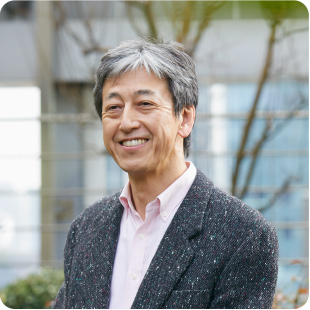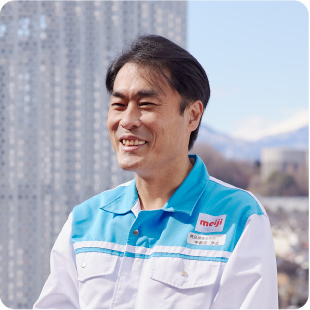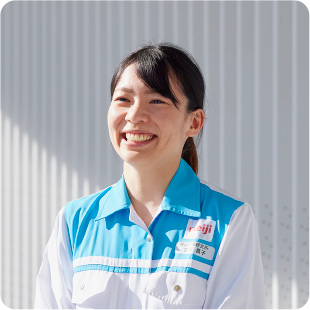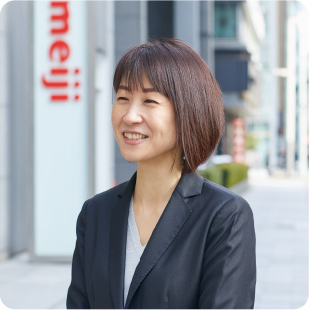
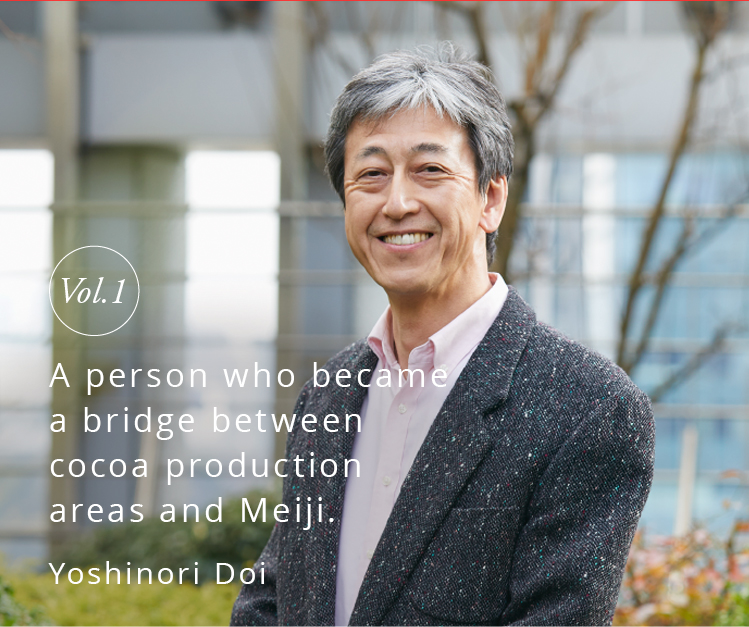
Yoshinori Doi is an essential and important person for Meiji Sustainable Cocoa. He is one of the members who started Meiji Cocoa Support. How did he start working for the future of cocoa farmers and cocoa beans, and how has he supported them for so long?
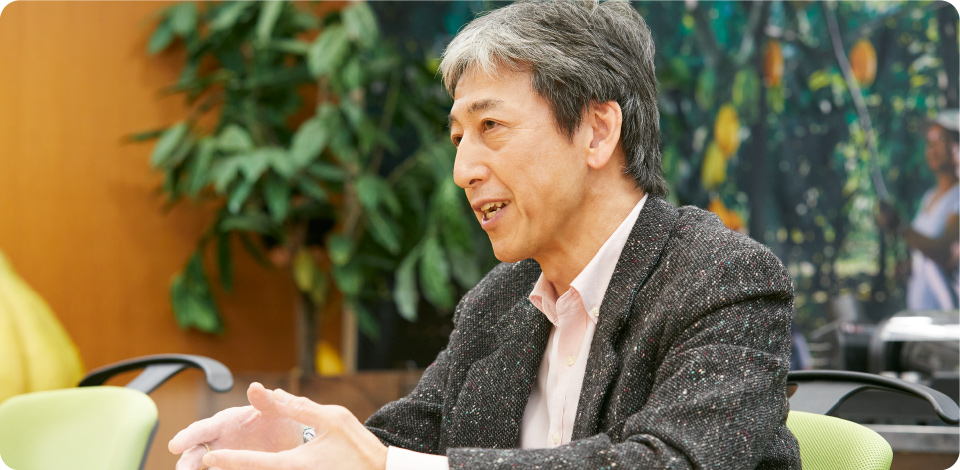
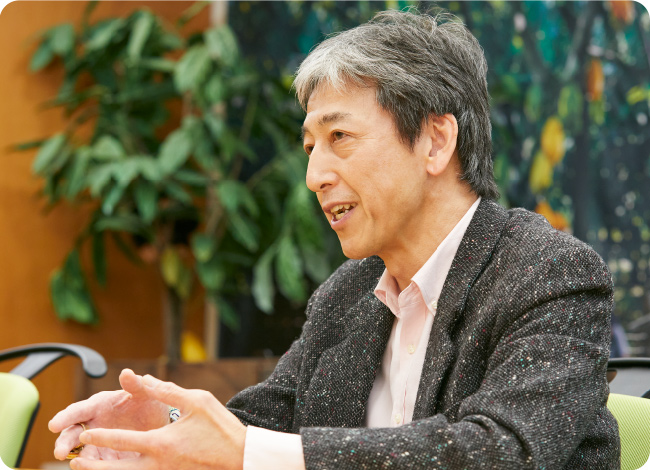
The cocoa producing areas lacked infrastructure. It all started with the thought that something had to be done.
I started Meiji Cocoa Support (Below, MCS) when I visited Ghana to research the quality of cocoa beans. There were the harsh living conditions of cocoa farmers. The village had no irrigation system to supply water to the farmlands. They also lacked basic infrastructure, including water, electricity, gas and roads, to support their lives. The situation was not sustainable at all.
As a company that integrally produces and sells chocolate from cocoa beans, I thought it necessary to provide support to cocoa farmers and build a good long-term relationship with them.
After returning from Ghana, I explained the situation in the cocoa production area within the company and called for the need to support farmers. My boss told me, "Why don't you give it a try?" and the following year, in 2006, MCS started.
At the time, the MDGs, the predecessor to the SDGs, were little known, and the activities of MCS, which would continue for a long time, had surprisingly small beginnings.
First thing, I did was donate a well that the villagers needed most. The water supply penetration rate in Ghana was still low, and it was a daily work to go to the river several kilometers away to obtain water for domestic use. What's more, it was mostly the work of women and children, and they travel back and forth several times a day. I wanted to improve this situation and decided to drill a well.
However, we don't get any news that the construction has started, and we don't get any reports that it has been completed. Even if you decide to do one thing and try to do it, as you think in Japan, it will not go according to schedule. We gradually accepted the local time frame and method. The well was somehow completed in a year.
All the villagers participated in the demonstration ceremony of the well. When the first pumping out of the water, there was a big cheer. The scene is still burned into my memory.
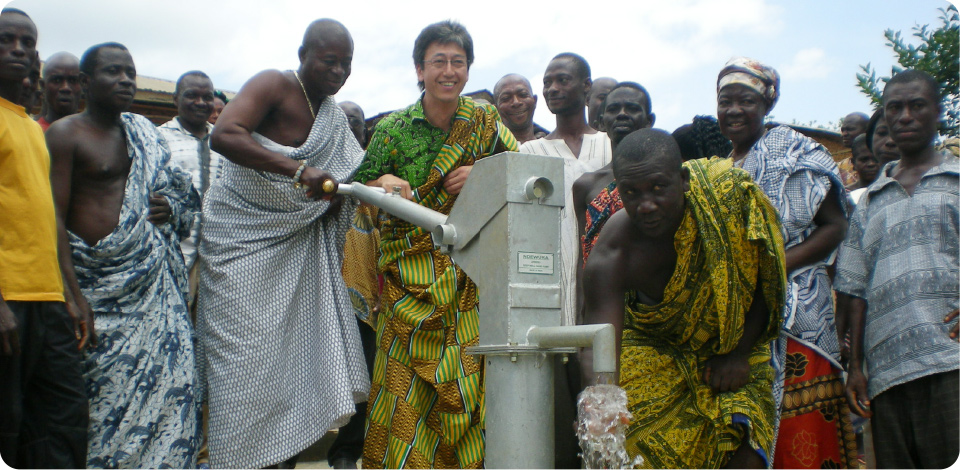
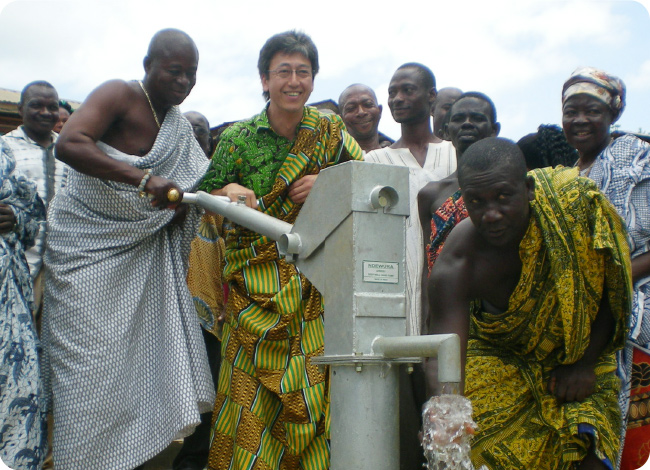
Appointed development chief of the village. A great responsibility to the community was born.
I was recognized by the village for building a well in Ghana, and was appointed to the development manager of the village.
I was given a gold bracelet, a ring and a colorful national costume as a proof of a chief.
In Ghana, a chief is a respected traditional chief, but his responsibilities are also significant. As one of the chiefs, I have to contribute to the development of the village.
Subsequently, I donated mosquito nets to prevent malaria, seedling of cocoa, and agricultural materials such as fertilizers and pesticides, and provided training in cultivation techniques.
We also used Japanese ODA (official development assistance) to encourage the construction of elementary schools, and with the help of many people, we were able to open the school in 2013.
In addition, due to a shortage of teachers, we held "Art Classes" which children could draw paintings on the theme of cocoa using paints and crayons, and "Chocolate Classes" which children made chocolates from cocoa harvested in their own villages.
The children were really enjoying their first experience. Most of their parents are cocoa farmers, so many of their children should end up taking over the family business.
I started the classes because I wanted people to be interested in cocoa, which will eventually become their bread and butter.
The children smiled and the adults told me to keep the class going, which made me very happy.
I believe that supporting the children who will lead the future of the village or the country, even if only a little, will lead to fulfilling our responsibilities as development chiefs.
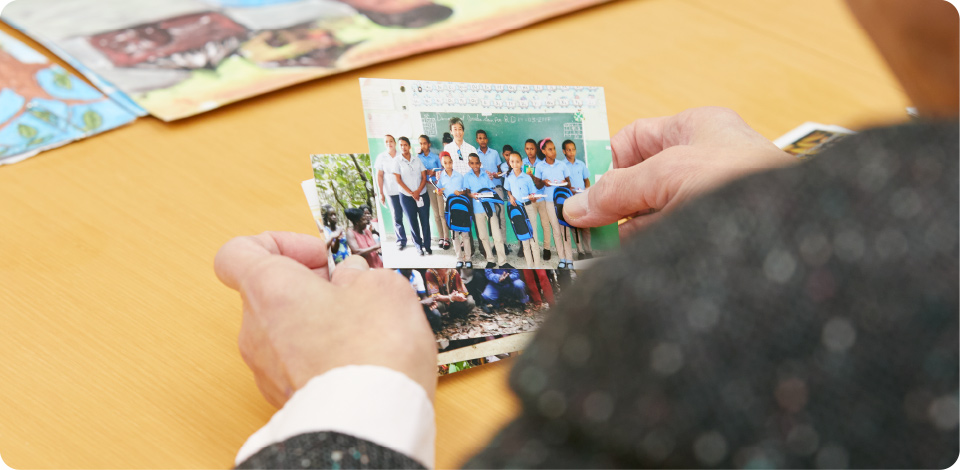
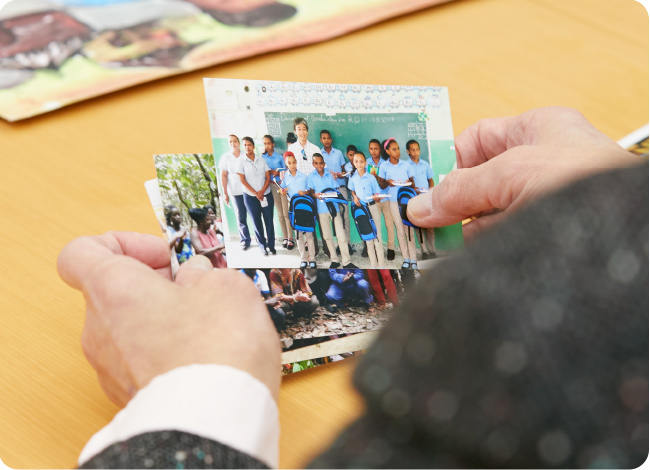
Absorbing local needs, this is the basis of MCS.
When MCS started in Ghana, support from the village community was the core. Gradually, activities that directly led to an increase in the income of farmers were required, and the content of teaching cultivation techniques and farming techniques became focused.
Many of them remained less productive because they grew cocoa in an old-fashioned way on their farm that had been passed down from generation to generation.
Without sufficient income, it will become difficult to continue cocoa farming as a business. This will lead to crop transfers and land sales.
Unless this situation is improved, stable production of cocoa cannot be expected.
Most cocoa farmers had not prune cocoa because they wanted to harvest a lot of cocoa.
However, if cocoa is not pruned, the entire farm will accumulate moisture, resulting in illness and mold, resulting in reduced yields and poor quality.
Therefore, we created a model farm to compare the differences in harvest volume according to whether or not pruning work was done, and we decided to have neighboring farmers gather and see it on a regular basis.
In this way, more and more farmers started to try to prune by actually confirming the effects with their own eyes and convincing them.
MCS, which began with visits to Ghana, has now spread to nine countries worldwide, including Venezuela and Ecuador.
The situation of farmers varies from country to country and region to region, and their needs vary, there is a wide range of support.
In addition to donating goods and activities aimed at improving productivity, the Meiji Laboratories staff also provide unique support to Meiji as well, including original fermentation technology guidance and activities to preserve rare species.
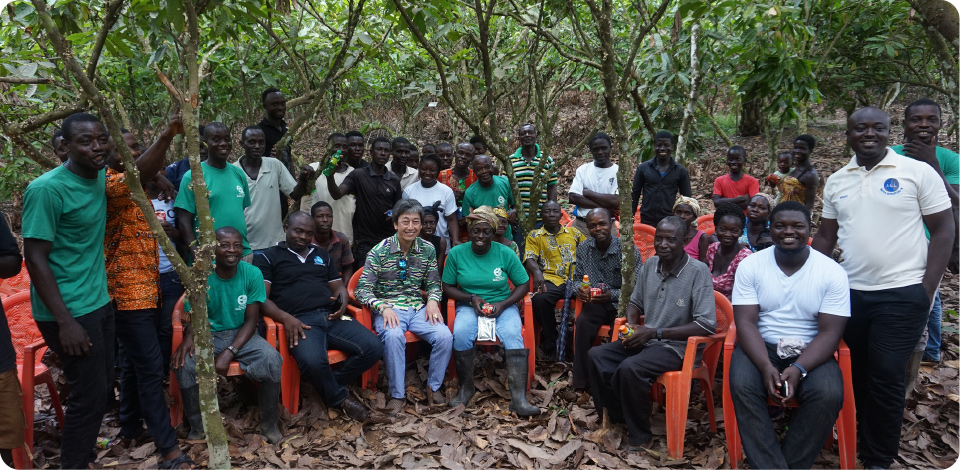
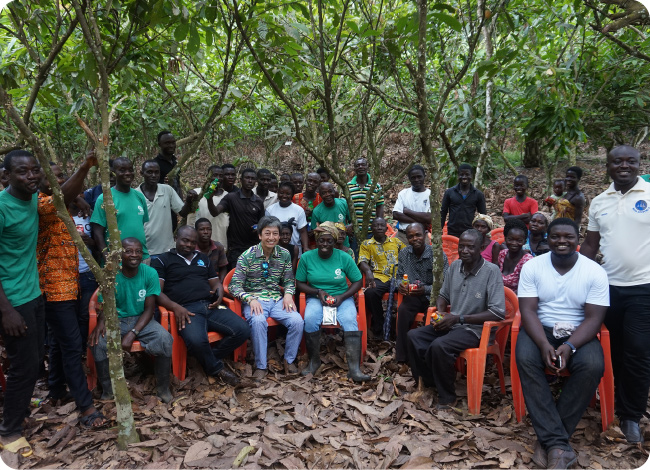
Make everyone smile.
Meiji cocoa support still continues.
More than 15 years have passed since we began our MCS.
We have also provided support for improving productivity, including training in cultivation techniques. However, since cocoa's production volume is affected by the weather and the way farms are procured changes, it is difficult to measure the effectiveness of support in numbers.
However, the provision of materials such as seedling, fertilizers, and pesticides is a very effective support, and appropriate control of production volumes has resulted in a 20% increase in yield per unit.
We have continued to provide various kinds of support to meet the needs of each growing area, but we still do not have enough.
A particularly serious problem in West Africa is child labor and deforestation associated with cocoa. Both are attributed to poverty and cannot be solved by a single company.
We are working together with the industry, the government, and relevant organizations, but we have not reached a fundamental solution.
The most vulnerable members of cocoa industry is cocoa farmers upstream in the supply chain.
From the farmers who produce cocoa to the consumers who eat chocolate, I believe that earning a profit or paying for the value added at each stage will lead to the establishment of a sustainable cocoa industry.
I think that is a matter of course, but unfortunately it is difficult to realize it under the current economic system.
We need to understand and understand the value of raw materials, products, and services in order to purchase or have them purchase at a fair price commensurate with their value, and we feel that our efforts to do so are still insufficient.
We have been promoting MCS with the desire to make everyone connected by cocoa smile.
I think cocoa is a "God's food" with the power to make people smile.
Due to the impact of the COVID-19, we are unable to go overseas now, but we are connected to the production area online, and we are continuing our support.
I would like to go to the production area as soon as possible and walk around the farm chatting with the farmers.

- A person who became a bridge between cocoa production areas and Meiji.
- Yoshinori Doi
In 2005, he visited Ghana for the first time. He became acutely aware of the need to support cocoa farmers, so he worked in-house and started meiji cocoa support in the following year.
Since then, he has been in charge of planning and implementing the support around the world, and continues to the present.
In 2009, he was officially appointed as the development chief by the village of Aserawadi in western Ghana, and continues his activities there.







